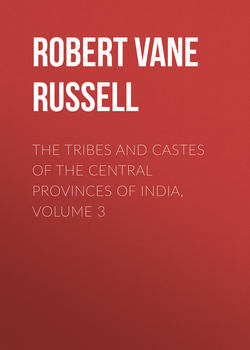Читать книгу The Tribes and Castes of the Central Provinces of India, Volume 3 - Robert Vane Russell - Страница 66
Gond
(f) Religion
48. Agricultural superstitions
ОглавлениеWhen there is drought two boys put a pestle across their shoulders, tie a living frog to it with a rag, and go from house to house accompanied by other boys and girls singing:
Mendak Bhai pāni de,
Dhān, kodon pakne de,
Mere byāh hone de,
or ‘Brother Frog give rain; let the rice and kodon ripen; let my marriage be held.’ The frog is considered to be able to produce rain because it lives in water and therefore has control over its element. The boy’s point in asking the frog to let his marriage be held is that if the rains failed and the crops withered, his parents would be unable to afford the expense. Another method of obtaining rain is for two naked women to go and harness themselves to a plough at night, while a third naked woman drives the plough and pricks them with a goad. This does not appear capable of explanation on any magical basis, so far as I know, and the idea may possibly be to force the clemency of the gods by showing their extraordinary sufferings, or to show that the world is topsy-turvy for want of rain. A leather rope is sometimes tied to a plough and harrow, and the boys and girls pull against one another on the rope in a tug-of-war. If the girls win they think that rain will soon come, but if the boys win that it will not. In order to stop excessive rain, a naked bachelor collects water from the eaves in a new earthen pot, covers the pot with a lid or with mud, and buries it beneath the earth; or the pot may be filled with salt. Here it may perhaps be supposed that, as the water dries up in the pot or the salt gets dry, so the rain will stop and the world generally become dry. The reason for employing women to produce rain, and men to stop it, may be that women, as they give milk, will be more potent in obtaining the other liquid, water. Nakedness is a common element in magic, perhaps because clothes are considered a civilised appanage, and unsuitable for a contest with the powers of nature; a certain idea of impurity may also attach to them. If a crow in carrying a straw to build its nest holds it in the middle, they think that the rains will be normal and adequate; but if the straw is held towards one end, that the rains will be excessive or deficient. If the titahri or sandpiper lays four eggs properly arranged, they think that sufficient rain will fall in all the four monsoon months. If only one, two or three eggs are laid, or only this number properly placed in the nest and the others at the side, then the rains will be good only in an equivalent number of months.
At the beginning of the harvest they pluck an ear of corn and say, ‘Whatever god is the guardian of this place, this is your share, take it, and do not interfere.’ The last plants in the field are cut and sent home by a little girl and put at the bottom of the grain-bin of the house. Chitkuar Devi is the goddess of the threshing-floor, and before beginning to winnow the grain they sacrifice a pig and a chicken to her, cutting the throats of the animals and letting their blood drop on to the central post of the threshing-floor. When they are about to take the kodon home, they set aside a basketful and give it to the sister’s son or sister’s husband of the owner, placing a bottle of liquor on the top, and he takes it home to the house, and there they drink one or two bottles of liquor, and then begin eating the new grain.
